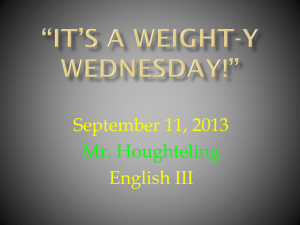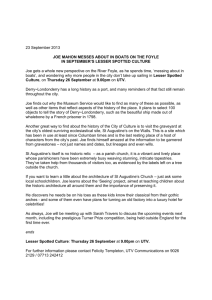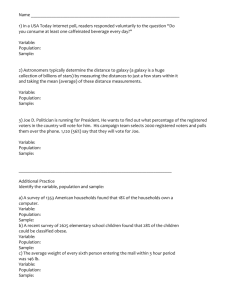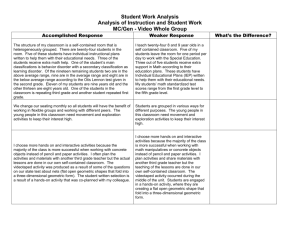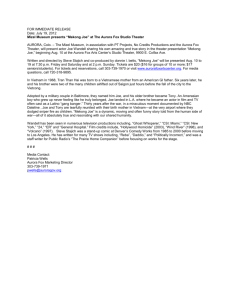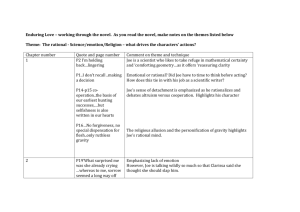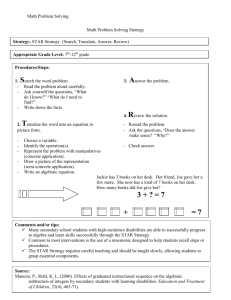SGJohnnyGotHisGun
advertisement
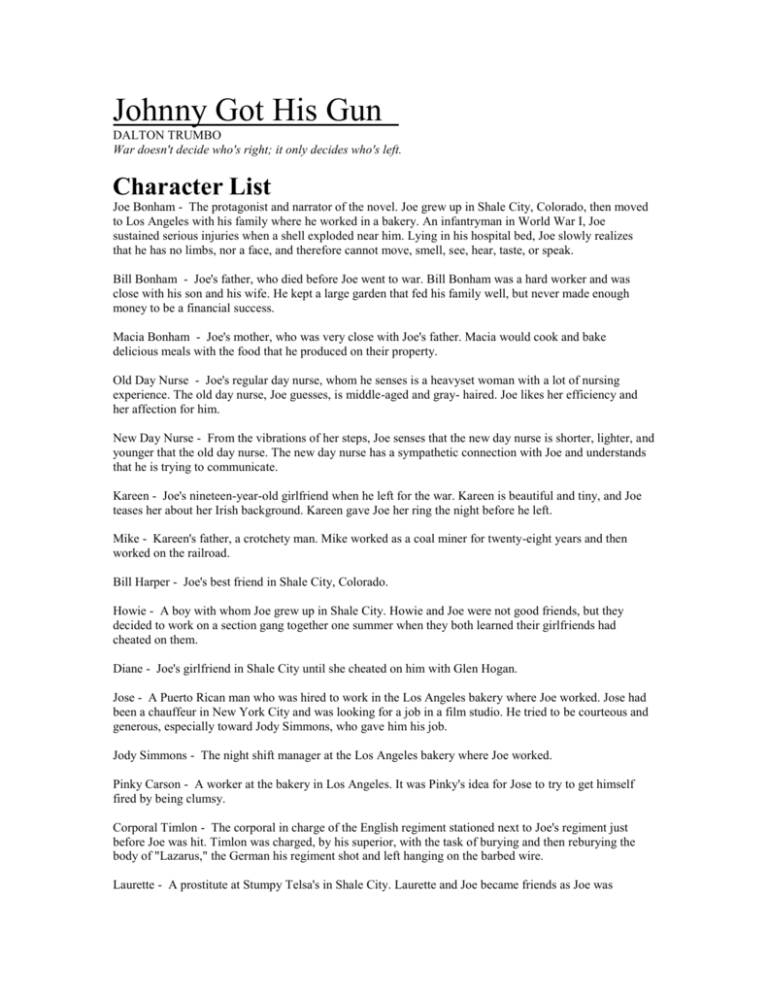
Johnny Got His Gun DALTON TRUMBO War doesn't decide who's right; it only decides who's left. Character List Joe Bonham - The protagonist and narrator of the novel. Joe grew up in Shale City, Colorado, then moved to Los Angeles with his family where he worked in a bakery. An infantryman in World War I, Joe sustained serious injuries when a shell exploded near him. Lying in his hospital bed, Joe slowly realizes that he has no limbs, nor a face, and therefore cannot move, smell, see, hear, taste, or speak. Bill Bonham - Joe's father, who died before Joe went to war. Bill Bonham was a hard worker and was close with his son and his wife. He kept a large garden that fed his family well, but never made enough money to be a financial success. Macia Bonham - Joe's mother, who was very close with Joe's father. Macia would cook and bake delicious meals with the food that he produced on their property. Old Day Nurse - Joe's regular day nurse, whom he senses is a heavyset woman with a lot of nursing experience. The old day nurse, Joe guesses, is middle-aged and gray- haired. Joe likes her efficiency and her affection for him. New Day Nurse - From the vibrations of her steps, Joe senses that the new day nurse is shorter, lighter, and younger that the old day nurse. The new day nurse has a sympathetic connection with Joe and understands that he is trying to communicate. Kareen - Joe's nineteen-year-old girlfriend when he left for the war. Kareen is beautiful and tiny, and Joe teases her about her Irish background. Kareen gave Joe her ring the night before he left. Mike - Kareen's father, a crotchety man. Mike worked as a coal miner for twenty-eight years and then worked on the railroad. Bill Harper - Joe's best friend in Shale City, Colorado. Howie - A boy with whom Joe grew up in Shale City. Howie and Joe were not good friends, but they decided to work on a section gang together one summer when they both learned their girlfriends had cheated on them. Diane - Joe's girlfriend in Shale City until she cheated on him with Glen Hogan. Jose - A Puerto Rican man who was hired to work in the Los Angeles bakery where Joe worked. Jose had been a chauffeur in New York City and was looking for a job in a film studio. He tried to be courteous and generous, especially toward Jody Simmons, who gave him his job. Jody Simmons - The night shift manager at the Los Angeles bakery where Joe worked. Pinky Carson - A worker at the bakery in Los Angeles. It was Pinky's idea for Jose to try to get himself fired by being clumsy. Corporal Timlon - The corporal in charge of the English regiment stationed next to Joe's regiment just before Joe was hit. Timlon was charged, by his superior, with the task of burying and then reburying the body of "Lazarus," the German his regiment shot and left hanging on the barbed wire. Laurette - A prostitute at Stumpy Telsa's in Shale City. Laurette and Joe became friends as Joe was finishing high school. Joe imagined that she was in love with him. Bonnie Flannigan - A woman, younger than Joe, who also grew up in Shale City. Bonnie and Joe met up again in Los Angeles. Lucky - One of the American prostitutes in the American House in Paris for soldiers overseas. Lucky and Joe would talk and gossip. Themes The Oppression of the Working Class Johnny Got His Gun is clearly an antiwar novel. While the root of this sentiment involves the brutality of war, Joe also protests the organization of modern warfare that has the interests of the moneyed classes as its purpose. Joe thinks in terms of an "us" vs. "them" axis, and it quickly becomes clear what he means by these vague designations. "Us," the archetypal little guy, refers to the poorer classes who work with their hands and make just enough money to be potentially happy within in their local life. "Them" refers to the upper, moneyed classes whose interests have dictated the war, yet who do not endanger themselves but instead send workers to fight against other workers. The oppression of the working classes by the upper classes is not a blunt matter of coercion. Instead, the novel tracks the ways in which power works through subtler means, such as through the misleading promise of abstract words such as "liberty." Socialism offers a helpful way of understanding the novel's politics, although nuances of Joe's convictions do not always strictly follow traditional socialist doctrines. The Unequal Bargain of War With Joe's conviction that war and its goals have nothing to do with him, or people like him, comes his understanding that people such as himself have nothing to gain by fighting in a war on terms of others. Joe understands that most men go to war for idealist hopes, but he is skeptical about the worth of these abstract ideals. Joe understands that abstract words like "democracy" and "freedom" can shift in meaning and are often meant to mean democracy or freedom for a specific few. Furthermore, Joe, with his unique position of being on the edge of life and death, can attest to the fact that dying men think only of their families, friends, and, most important, their wish to be alive—not about abstract ideals. Joe half-sarcastically suggests that men be offered concrete recompense for their fighting—a house, for example. Such compensation would perhaps alleviate the general feeling of being cheated that people such as Joe feel, making warfare seem slightly more "worth it." An important part of this theme, is Joe's tone of realism—he is there to say that the pain, injury, and deaths of war are not made nobler by an abstract cause; they are still horrific and to be avoided at all cost. The Horrific Consequences of Modern Warfare Near the beginning of Johnny Got His Gun, Joe feels the doctors amputate his arm. He wonders to himself where they will bury the arm and if they will honor it. The novel suggests that these are dilemmas that do not have to be addressed outside of modern warfare. Modern warfare creates unprecedented dilemmas and specimens of injury and decay. The unmatched horror of Joe's body is at the center of the novel, but this presence is reinforced by Joe's own remembered images and stories of men made grotesque by their wartorn bodies, such as the man whose face was burned off by a flare. The corollaries of the creation of these monstrosities by modern warfare are modern medicine and modern appetites. In Johnny Got His Gun, Trumbo portrays modern medicine as less a saving grace than an actual contributor to the monstrosities that war visits upon the body by war. Doctors manipulate damaged bodies for their own amusement and prestige, adding to the unnaturalness of soldier's bodies—as with the story of the doctors who sewed a flap over a man's open stomach wound so that others could lift it up and watch the man digest. The people with an interest in or an appetite for this sort of grotesqueness are the last by products of modern warfare. Joe understands the growing desire on the part of some people to see the freak casualties of war; he stresses his potential to serve as a visual attraction in order to get out of the hospital. Nostalgia for Pastoralism Related to Joe's horror at the monstrosities created by modern warfare and medicine is a subtle nostalgia for a pre-modern way of life. Joe's nostalgia for pastoralism also relates to his dissatisfaction with capitalism. Joe remembers fondly the ability of his mother and his father to produce, cook, and can all of their own food on the family's property and the vacant lot next door. Joe realizes that his father was a failure by the standards of modern capitalism, as he could never make enough money to save money. Nonetheless, Joe considers his father a success because his family always ate better than anyone, even the rich city people. Joe's nostalgia for the subsistence farming lifestyle also includes a desire for the time when the only concerns were local concerns, not national or international concerns such as warfare. Motifs: a recurring subject, theme, idea, etc., esp. in a literary, artistic, or musical work. Patriotic Songs The title of Johnny Got His Gun alludes to a wartime patriotic song that included the line "Johnny get your gun" in the refrain. The title's use of the past tense emphasizes the inappropriate optimism and blind patriotism of the original song: Joe Bonham did get his gun, and the results are that he has lost everything but his life and gained nothing in return. Several other patriotic songs thread through the narrative of the novel by way of Joe's memory. At the beginning of Book II, Joe remembers snatches of Alfred Lord Tennyson's poem "The Charge of the Light Brigade," written to laud a small brigade of English soldiers who rode into a battle in which they were greatly outnumbered and brutally defeated. Joe's narrative uses the scraps of these songs ironically, revealing their ultimate absurdity and inability to comfort recognized suffering and pain. Memories of Loss Book I of Johnny Got His Gun consists mainly of Joe's flashback memories. The only pattern of these memories appears to be that many of them recount a moment of loss for Joe. They involve scenes when people from Joe's life left never to return, or when Joe's relationship with someone permanently altered. This pattern fits in with the novel's upending of the classic coming-of-age narrative. Joe, rather than coming into his character through learning or epiphany, reaches formative points that center around instances of loss, building up to a final state in which Joe has lost parts of his self. Rebirth from Death Book I of Johnny Got His Gun is entitled "The Dead"; Book II is entitled "The Living." This trajectory from death to life points to one of the novel's particular fascinations: rebirth from death. The trajectory, however, is not treated as optimistically as we might expect, as we see in the figure of "Lazarus" from Joe's war memory, who is "raised" from the dead twice by an exploding shell only to be "killed" several more times by the British regiment. Joe envisions himself as a Lazarus at the end of the novel, when he finally is able to communicate with the outside world, yet he is shoved back in his "coffin" when the doctor denies his request to communicate and sedates him once more. In this sense, rebirth from death is part of a larger circle in which one is doomed to relive the pains of one's former life. Symbols: Something that represents something else by association, resemblance, or convention, especially a material object used to represent something invisible. Joe's Body Joe's body stands as the center of the text, symbolic of the inhumanity of modern warfare. Furthermore, Joe seeks to turn his body into a symbol as part of the storyline of the novel. He would like his body to be brought around as an exhibition. The body would stand for the concrete, brutal realities of war and it would counteract the attractiveness of abstract ideals such as "democracy" or "liberty." The Rat Joe dreams that a rat eats from the open wound in his side. The rat is part of a memory that Joe has from the war, when he and other soldiers found a dead Prussian soldier with a rat eating his face. The men chase the rat and beat it to death and feel silly afterward, but Joe recognizes the rat is the true enemy of all the soldiers. The rat represents the warmongers who stand to profit from war, just as a rat feeds itself off of the decay and injury of wounded or dead soldiers. Joe's Father's Garden Joe's father's garden is one of the novel's primary symbols of an older, subsistence way of life. Joe's father does not make money off of his garden—and is therefore unsuccessful by the standards of capitalism—but he produces enough in the garden to feed his family well. The symbol of the natural garden also alludes to the state of the Garden of Eden before the fall of man. In Joe's father's way of life, the outside world did not encroach, as the war has done. This symbol relates to the theme of nostalgia for pastoralism.

